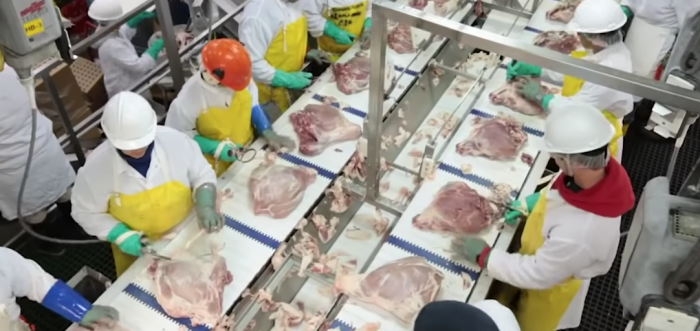Approximately half of US pork processing capacity has been shut down during the COVID-19 outbreak, according to the president of US meat giant Tyson Foods.
Industry representatives have warned that millions of pigs cannot enter supply and called for a co-ordinated euthanasia programme as stocks build-up on farms.
Tyson has been forced to close a number of pork plants, including two in Iowa and one in Indiana, which it is now planning to re-open. It has also shut some major beef plants.
Smithfield Foods, the world’s biggest pork producer, has been even harder hit, shutting numerous plants across the country, including the massive Sioux Falls plant, which accounts for approximately 5% of US pork production.
Sioux Falls, closed after hundreds of workers tested positive for the virus, has now resumed ‘limited operations’ after being shut for around three weeks, according to the Business Times. Smithfield, owned by China’s WH Group, reopened the plant’s ground seasoned pork and night clean-up departments with about 250 of the plant’s 3,700 workers returning, a spokeswoman for the United Food and Commercial Workers said.
The company plans to gradually restart more operations, but has not resumed slaughtering pigs, according to the union. Smithfield has made coronavirus testing optional for employees to go back to work, South Dakota Health Secretary Kim Malsam-Rysdony said.
Other major meat companies, including JBS, have also shut pork plants and the US Center for Disease Control has reported that 19 states have recorded COVID-19 cases in 115 meat and poultry processing facilities. Among around 130,000 workers at the facilities, there have been about 5,000 confirmed cases and 20 deaths, the Business Time reported.
Last week, president Donald Trump issued an executive order to mandate that meat plants continue to function, amid fears of national food shortages, although so far this does not appear to have stemmed the loss of processing capacity.
Tyson president Dean Banks told analysts the country’s capacity to slaughter pigs has halved during the course of the pandemic, Reuters reports. The company has consolidated its product offerings to help keep supplies flowing to consumers, he added.
Tyson has warned that it expects more closures. “We have and expect to continue to face slowdowns and temporary idling of production facilities from team member shortages or choices we make to ensure operational safety,” the company said in a financial statement, according to CNN.
“We will not hesitate to idle any plant for deep cleaning when the need arises,” CEO Noel White said.
The company, which had previously that the US food supply chain is breaking’, reported lower-than-expected earnings and revenue for the quarter ended on March 28, even before processors shut massive plants, with shares in the company down 8%.
Retail demand for Tyson’s meat has increased 30-40% as consumers stay home, but the company said sales will decline in the second half of the year because of lost foodservice and restaurant business.
The US National Pork Producers Council has called for Government support for farming families struggling during the crisis, including a £1bn pork purchase scheme.
The NPPC welcomed president Trump’s intervention last week. It said the order will ‘prioritise the continuity of pork processing plant operations’.
Co-ordinated euthanising approach
NPPC president Howard A.V. Roth thanked president Trump for taking this step and called for co-ordinated measures to address the massive build up of pigs on farms.
“We must safely stabilize the current plant capacity challenge and overcome other major hurdles facing the nation’s pork production system, one that employs 550,000 workers and generates $23 billion in personal income across rural America,” he said.
“Hog values have plummeted to virtually zero and hog farmers are facing liquidation of their farms and other assets without immediate relief, including expanded financial aid without payment limitations.
“While getting pork packing plants back online is foundational, the tragic reality is that millions of hogs can’t enter the food supply. We need coordinated partnership between the industry and federal, state and local authorities to euthanize pigs in an orderly, ethical and safe way.”




